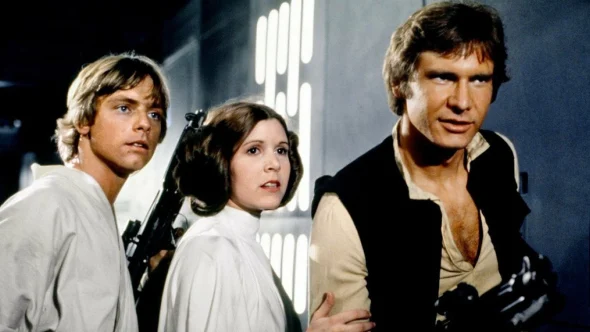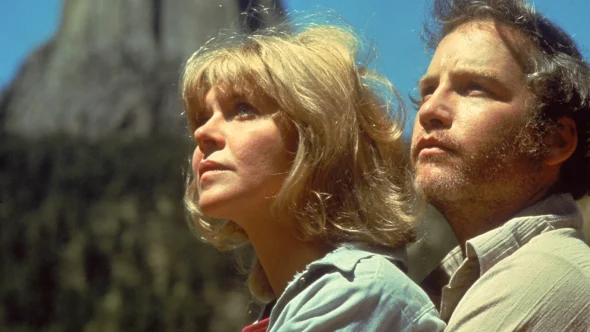
Gareth Edwards is a filmmaker torn between dueling impulses. "Half of me wants to do the classical, conventional style of filmmaking, where you have everything storyboarded and very considered and well planned out," he explains, citing the visual vocabulary of greats like Steven Spielberg and James Cameron. "And then the other part of me loves people like Terrence Malick."
According to Edwards, this creative conflict can be traced all the way back to his first film, the 2010 micro-budget sci-fi hit, Monsters. "I took a semi-documentary approach, and I had a lot of creative fun making that film," he says. "I've always felt torn over what style to bring to a film, and ultimately, The Creator became a hybrid of a few different styles."
Set in a future where America has gone to war against artificial intelligence, The Creator fully embraces its conflicting influences. The film is full of sweeping shots that call to mind the work of blockbuster auteurs like Cameron, as well as the impressionistic cutting techniques and close-up intimacy of a late-career Malick drama. The latter is most evident in an early interaction between the movie's central couple, played by John David Washington and Gemma Chan.
"It's funny, because we shot that opening scene with John and Gemma for what felt like hours, and I just couldn't quite believe any of it," the director admits. "There was something about it that felt a little contrived. I started panicking, because it's arguably the most important scene in the film. In the last 20 minutes we had, I said, 'Forget everything we've done.' I shot it like a documentary, and that ended up being what we used in the movie."
Below, Edwards shares with A.frame his five favorite films, including classics from George Lucas, Quentin Tarantino, and Spielberg that continue to inspire his own work.

Written and Directed by: George Lucas
I think the planets aligned more for Star Wars than they have for any other movie. When you think about everything that had to come together perfectly so that it wasn't just Flash Gordon, it's astonishing.
You've got George Lucas at the peak of his talents, and him discovering the hero's journey storyline that everyone has been riffing on ever since. You've got Industrial Light & Magic forming — the greatest visual effects company in the history of cinema. You've got John Williams, the world's greatest composer, creating possibly his greatest work. You've got so many great actors coming onboard, including Harrison Ford, the star of a generation. And then there's concept designers like Ralph McQuarrie working on the film. If George had hired a different designer, I don't know what Star Wars would have looked like. There are so many things that just came together.
If there are parallel universes, I think we live in the universe where Star Wars is its best version. There may be universes where Harrison Ford isn't in it, or John Williams didn't do the music, or Ralph McQuarrie didn't do the designs. In those worlds, it's still a brilliant movie, but I feel like we're in the universe where everything came together perfectly. George didn't just inspire a whole generation of filmmakers, he also liberated them by embracing and pursuing the advancements in digital technology that allowed my generation to go off and make films with digital cameras and edit them on our computers. We all owe so much to him, so Star Wars really has to be on this list just by default.

Written and Directed by: Steven Spielberg
Steven Spielberg is the absolute master. He's so hard to imitate. It's like there's a special sauce to his films, and no one else has found the formula for it. I'm not sure he himself even knows what it is. That run he had in the late '70s and early '80s has yet to be surpassed in my opinion, and it's hard to pick a favorite from the films he made then, but Close Encounters of the Third Kind is probably the one I've watched the most to try and learn from.
It's got magic and awe and, if it was released today, I think it would almost be considered an arthouse film. It's not a blockbuster in the same sense that blockbusters have become now. It's a very cerebral, artistically done, timeless film. It also feels like it's very much about being in awe of cinema. It's about being captivated by this illuminating image and wanting to be taken away from your mundane life. It's kind of a metaphor for going to the cinema, and so I see it almost as the archetypal love letter to film and escapism.
Again, John Williams composed a beautiful score for it. It's just magical. It's so well done. It's kind of depressing how well done it all is, because no matter how hard you try in your life, you're never gonna make a movie as good as Close Encounters of the Third Kind.

Directed by: Ron Fricke | Written by: Rob Fricke, Genevieve Nicholas, and Constantine Nicholas
Baraka is a great example of the power of cinema. It doesn't work just as a screenplay. It doesn't function as a story that you can tell your friend. It only works by hitting play and sitting and watching it. It's pure cinema in that sense. It's like if God had made a film, it would probably be Baraka. It's a very objective, spiritual film, and you bring your own meaning to it. It's as interesting and profound or boring as you are. I'm highly suspicious of people who watch the film and don't like it; it's a good test in that way. Finding out how someone feels about it is a good way to tell if you're gonna get along with them or not.

Directed by: Frank Capra | Written by: Frances Goodrich, Albert Hackett and Frank Capra
I can only imagine Frank Capra's disappointment that It's A Wonderful Life wasn't a hit when it was released, because it's a masterpiece. It's a story that explores the perfect spectrum of human emotions. When you sit and watch that movie, whatever mood you're in, whether you're angry, pissed off, happy, melancholy, or whatever, at some point in its runtime, it takes you on such a journey of emotions, and then you always come out the other side of it fighting tears. It's so life-affirming. I watch it every Christmas Eve with my mom while we're wrapping presents.
I think it's just such a perfectly written story. It's like the ultimate parable from the Bible that never existed. It's not cheeseball, either. It's about suicide and about your work feeling worthless and wanting to give up. It really goes to some dark places and then eventually reaches a place where you feel like it's all worth it. It's like therapy, watching It's a Wonderful Life.

Written and Directed by: Quentin Tarantino
I saw Reservoir Dogs seven times at the cinema. I think I was at the perfect age for it when it came out. I was about 15 or 16, and I wasn't overly familiar with World Cinema at that point. I was just starting to get into it, and watching Reservoir Dogs, it was like someone had taken all of those great films and so much great filmmaking vocabulary and made this perfect little story. It's like a stage play, and for someone who had grown up on Hollywood blockbusters, it blew my mind. It borrows from other films, but having now seen those movies, I still think there's a genius to Reservoir Dogs in the way that it uses its ingredients to create the perfect recipe.
What I really love about it is that it's structured almost like a pyramid. There are nearly a dozen characters at the start of it, and then, as the film progresses, you care about fewer of the characters. Some of them die off and then you care about even fewer characters, until there are literally just two people left in the frame. Then the big twist happens and you realize that one of them is going to die, but you never see the cops show up. The camera keeps tracking in until there's only one character you care about in the frame, and then the second you hear the gunshots, he drops out of frame. That's the end of the story. It cuts immediately to the end credits. It's one of the most perfect and efficient pieces of storytelling that I've ever seen.






